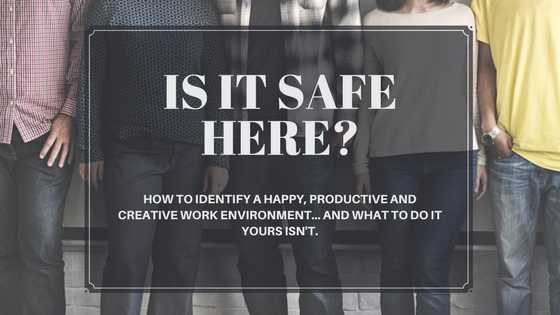What is a safe work environment? The easiest way to think about it is to remember a time (and most of us have had them) when we were NOT in one.
Have you ever worked on a team where people jockeyed for position, over-managed, argued all the time, delivered criticism in public, shot down ideas, were afraid of taking risks, had to walk on eggshells, never worked on any kind of consensus and constantly ran behind schedule?
Yeah – we’ve all been there, and those are all signs of an unsafe work environment.
As the leader of a team – you do NOT want that to be the reality for the people you work with.
Unsafe (sometimes called toxic or poisonous) workplaces are the cause of a lot of unhappiness at work, and by extension, cost a lot of money. Unhappy, unmotivated and essentially SCARED employees are not poised to best serve your customers, support each other, or help your company grow.
I’m going to talk a little more about the effects of unsafe work environments. But first, a note about the term “Safety”
Before getting too far into things, I want to emphasize the difference between ‘safe’ from a communication and management standpoint, versus that of a diversity and inclusion perspective. This article is about creating an environment where employees feel comfortable, happy and motivated to take risks and succeed based on your management practices. This post is not about making sure your workplace is physically or emotionally safe based different kinds of oppression; however, you should absolutely read up on that, and here are some starter articles for you about Being Black in the Workplace, Being Trans-Inclusive and Supporting Employees with Disabilities.
What happens when you have an unsafe workplace?
There are a lot of negative outcomes created by an unsafe workplace. Some of them will endanger the success of your business, while others will just make people miserable. Many do both.
Some of the most common results of unsafe environments are:
High Turnover. Unsafe workplaces are STRESSFUL, and stress burns people out. If you don’t like constantly hiring and training replacements, it’s a good investment to make sure people want to stick around.
Idea Loss. If a team member is afraid to come forward with ideas and innovations, you’re missing out on whatever those potentially valuable contributions could be.
Teamwork Fails. If your team members don’t know or like each other, WORKING together is going to be a challenge. When people are placed in opposition to each other, they never gel into a cohesive unit. Your customers will notice.
No Dedication. Not everyone needs to love their job, but when you run a business, you want to know that in emergencies and crunch times you can count on your team to help you through. If your employees have no loyalty to or connection with your broader business goals, they’re not going to show up when the shoe drops (for the record, they will be right not to care).
General Misery. Not every job is fun. We all have to do things we don’t like, but there is a huge difference between THAT and dreading showing up to work every day. Work, even boring, repetitive work, doesn’t have to suck as much as it often does.
So what makes a work environment safe?
I’m glad you asked.
There are several signs of a safe work environment:
- People willingly ask for help and support.
- Team members take on tasks they might fail at.
- There is a healthy amount of communication and FUN going on between team members.
- People volunteer to help out with big, short notice or onerous tasks.
- Team members share credit unprompted.
- Most people stay on the team for a long time (longer than 1 year).
- People let you know they messed up as soon as they realize it.
- You feel comfortable publicly admitting your own mistakes.
All of these signs point to one major element: Trust.
Trust is the foundation of a safe work environment. Your team members need to TRUST that they can take a risk and not be fired. They need to TRUST that their hard work is going to be rewarded. They need to TRUST that they can have fun with colleagues without fear of reprisal. They need to TRUST that sharing credit will go both ways. They need to TRUST that asking for help won’t be held against them.
Your team needs to trust YOU, their manager or leader.
And that means you need to prove it. You need to prove these things are true again and again, every day, and in all your interactions with them.
How Do You Make Someone Trust You?
You don’t.
You DEMONSTRATE that they can, and other team members INFORM them that they can.
Those are the options – the only ones. You don’t get to be all talk and no action, and you don’t get to decide things are a certain way because you want them to be. You need evidence that you are creating trust, and that can’t come from your thoughts or words. Only YOUR actions, and OTHER people’s words.
Most managers say: “My team can come to me with anything.”
Most managers believe: “People like it here.”
Most managers think: “I take responsibility for my mistakes.”
Most managers are wrong.
So… what if your workplace ISN’T safe?
Then, my friend, you’ve got problems.
And you would be wise to start taking corrective action.
There’s the long answer for how to solve this, and the short answer for how to solve it.
I’ll be addressing the long answer in the future, but the short answer is this:
If you don’t have a safe workplace, admit it. Share it.
- Talk about it with your team.
- Tell them that you can see there are problems, and that you are going to commit to change.
- Announce this in a group meeting, and make sure they know it will take time, but you are going to make it a priority, starting with finding out how THEY feel about what is going on – anonymously.
Does the idea of asking your entire team for feedback on your performance as a manager make you nervous? It shouldn’t.
If you are afraid of what you are going to hear, then you already KNOW you need to make changes, and this feedback will help you.
If you think you have no problems with your management style, then you should welcome the thoughts of your team.
If you don’t respect the opinions of your team, and feel like they would blame or judge you for things that aren’t your fault, or not understand your position – then you need this more than anyone else because there is NO trust in your workplace, and eventually that’s going to come back to bite you in the ass.
So I challenge you to send all of your direct subordinates an anonymous survey where they can, without fear of reprisal, tell you what they think about working for you.
Do you dare?

